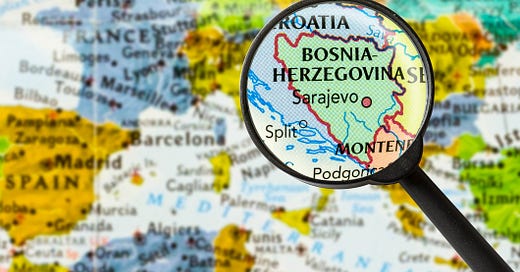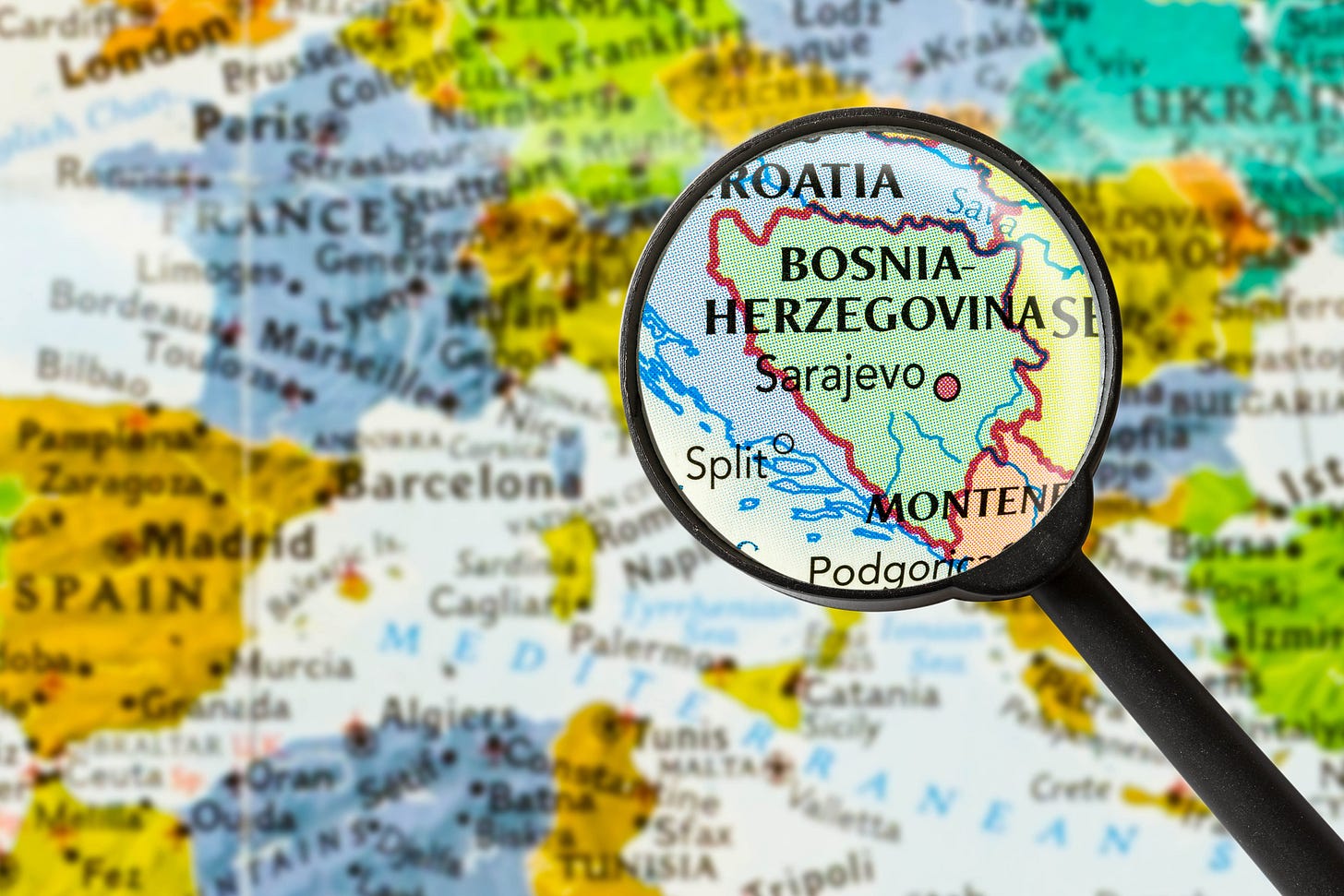The devastating 1990s war that ravaged Bosnia also ruined its economy and infrastructure throughout almost four years of the war. Bosnia is one of the most vulnerable countries in the Western Balkans, brought on by the failed Dayton Peace Agreement signed on December 14, 1995, ending the war but putting the country under conservatorship making international community take charge of its functioning. It created two entities: Federation of Bosnia and Herzegovina for Bosniaks and Bosnian Croats, and Republika Srpska (RS) that was created out of genocide committed in Bosnia. The RS, under the leadership of Milorad Dodik has kept Bosnia hostage, refusing to pass reforms that would help the country join NATO and the EU.
The issues of the past are still present. The wartime rhetoric of Serbia thrives to this day, especially their continued hope of Greater Serbia, an idea which goes back to the Nacertanije, a draft of a political program written in 1844 by Ilija Garasanin. It becomes actual whenever a war erupts in the Balkans. According to that, the Greater Serbia should cover all the territories "where there is even one Serb alive, or there is his grave." This view continues, even amongst the Bosnian Serbs.
In Bosnia, Dodik is Serbia’s President Aleksandar Vucic’s biggest ally. He has repeatedly threatened to secede the RS from Bosnia. For that, he was sanctioned by the US and much later by the UK. Dodik takes instructions from both Vucic and Russia’s President Vladimir Putin in destabilising the country. But so does another ally of Dodik’s, the leader of the Croatian Democratic Union of Bosnia and Herzegovina (HDZ-BiH), nationalist Dragan Covic who told Russian newspaper he regrets that Russia has not got a bigger influence in the country. In Bosnian parliament last year, Covic and Dodik voted against imposing sanctions on Russia. Croats and Serbs only see eye-to-eye when it comes to one thing, and that is destabilisation of Bosnia.
But they also have an unlikely ally, High Representative of Bosnia, Christian Schmidt. On the night of October 2, 2022, during Bosnia's elections, he illegally imposed electoral reforms which supported segregation. But it was what the Bosnian Croats wanted. For months, Schmidt had consulted with Croatia's nationalist President Zoran Milanovic, who has sought to destabilise Bosnia from the first day he became the Croatia’s president. One of his and his predecessor's, Kolinda Grabar Kitarovic's objections are targeted at Bosnian Croat member of the Bosnian Presidency Zeljko Komsic. Despite the fact that Komsic is a Bosnian Croat and leader of Democratic Front, Croatia’s government thinks that only member of HDZ-BiH should have the right to be a member of Bosnia’s presidency. That is entirely because Croatia’s government needs someone they can control in Bosnia, and that is always HDZ-BiH. But with Schmidt, they now have a golden goose to help them keep the country on its knees and destabilise the peace.
The new electoral reform, which Schmidt has no power to impose, makes the majority Bosniaks in Bosnia a minority and further alienates the Jews and Roma but favours wartime rhetoric of Croats and Serbs. The illegal imposition of electoral law was supported by US President Joe Biden's State Department and the British government, and it risks the eventual creation of a third entity for Bosnian Croats. This would see the breakup of Bosnia, an idea heavily backed by the British government during the 1990s wars when its diplomats and Prime Minister John Major's Conservative Party, especially Foreign Minister Douglas Hurd, tried to paint Bosnia as an Islamic country to prevent Americans from ending the war. So, it is no surprise that the British government would back the deprivation of human rights for the Bosniaks. And no matter who was in Downing Street, their policy against Bosnia remained unchanged.
But the alarming issue was Biden's support. The Biden administration has betrayed American idea of democracy by supporting Schmidt's electoral reforms. The Dutch Member of the European Parliament, Tineke Strik, speaking to Bosnia's N1 channel in October 2022, said that the Office of High Representative no longer had the credibility for his position adding that by "taking the decision to amend Bosnia Electoral Law the High Representative has sided with one of the policies of Bosnia." Further to that, 25 members of German, Dutch and French parliament wrote to Schmidt to withdraw the electoral reform. But it fell on death's ear. Schmidt was due to address the European Parliament on November 30, 2022 but cancelled last second. He is undoubtedly aware that his actions are illegal and against international laws and human rights. But he is relying on the Biden administration and the UK to support his nationalist politics favouring Croatia. When Schmidt introduced that law, Croatia, and the Biden’s State Department were the first to applaud it.
But when Schmidt has the power to change issues in Bosnia, he does not use it. He picks and chooses what he wants to change whether there is legal path to it or not. Not long ago, Croatian government awarded him the same medal, Order of Ante Starcevic, that was given to military and political leadership of the wartime illegal Croat entity of Herceg-Bosna for which those Croats were found guilty of committing war crimes in Bosnia. By accepting that Order, Schmidt has allowed himself to be in the same category. His electoral reform supports the politics of Russia, Serbia, and Croatia, whose common goal is to destabilise and partition Bosnia, while the international community once again remains silent.
For instance, Schmidt refuses to prevent Dodik from hosting the Day of Republika Srpska. This event is held every year on January 9th and has been ruled unconstitutional on two occasions by the Constitutional Court of Bosnia and Herzegovina. This event is marked with a display of armoured vehicles, members of the specialist units and other police forces of the RS marching alongside. This is the formation that has been ruled by international courts as accomplices to genocide in Bosnia. Serbia’s Minister of Foreign Affairs, staunch genocide denier Ivica Dacic, attended this year’s event. Serbia does not want a peaceful co-existence with its neighbour. Vucic’s sole purpose is to invade, conquer, and rule over Bosnia, just like he is trying to in Kosovo while the international community turns a blind eye.
That very same community is again looking at Bosnia the way they did during the 1990s wars. It will not be Kosovo that will destabilise the Western Balkans, and we must not mistake Kosovo for Bosnia. In Kosovo there is a more substantial military presence in the form of Kosovo Force (KFOR), a NATO-led international peacekeeping force. In contrast, Bosnia has Operation Althea (previously EUFOR), which is weak in numbers and strength and would not be able to handle any attack. Russia almost voted to remove them from Bosnia, but Dodik lobbied Putin because he did not want the presence of NATO troops which was rumoured at the time as an option to deploy had Operation Althea ended its mandate. Any NATO presence in Bosnia would deem the country untouchable.
Bosnia's EU candidate status does not exempt it from a new fresh conflict that the international community is cooking with electoral reforms. If a new war does engulf the region, and Russian paramilitary group Wagner which is present in Serbia and trains members of Serbia’s far-right, will be the direct representation of Putin's rhetoric in the Western Balkans. But this time, it won't be the war amongst the neighbours, instead it would engulf the EU, and have the implications for US landpower.
Whatever next is in the Western Balkans, I hope it is a peaceful way forward for citizens that have suffered for far too long, dictated by corrupt elites that made names and careers for themselves from the suffering of the Bosnian people. War is only a solution for the local and international actors, war profiteers and their political movements. Bosnia must move forward and away from wartime rhetoric and look towards a future in the EU and NATO. That would be the only way to guarantee its survival. But the international community should also stop with interference in country’s institutions just because they want to wash their hands of the problem they caused with the Dayton Peace Agreement.
About the Author
Nadina Ronc is a Foreign Affairs Analyst and Journalist with a speciality in the Western Balkans, Russian foreign policy and energy security. Her “Bosnia and Russia: The Implications for European Security and US Interests” was published by the Journal of Peace and War Studies. The original concept for this research was supported with funding from the Strategic Studies Institute of the U.S. Army War College. She is also published internationally on topics of war crimes, Russia, and the Western Balkans. Nadina is co-author of a memoir-in-progress, based on her experience as a refugee fleeing the war in 1990s Bosnia.





